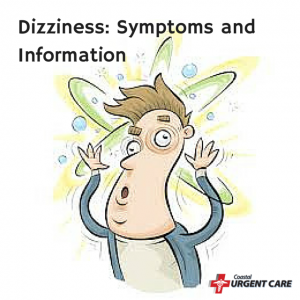 Dizziness is used to describe a wide variety of symptoms. Typically, someone will say they are woozy or unbalanced. Dizziness that feels like either you or the room around you is spinning is called vertigo. It is important for you to explain to your urgent care doctor what you mean when you say you are feeling dizzy. The 2 most common conditions referred to by the term “dizziness” are vertigo and lightheadedness.
Dizziness is used to describe a wide variety of symptoms. Typically, someone will say they are woozy or unbalanced. Dizziness that feels like either you or the room around you is spinning is called vertigo. It is important for you to explain to your urgent care doctor what you mean when you say you are feeling dizzy. The 2 most common conditions referred to by the term “dizziness” are vertigo and lightheadedness.
Vertigo is a loss of balance and you will not be able to stand up straight. This loss of balance often comes with nausea,vomiting, and sweating. Not only will you not be able to stand the room often seems to be spinning around you. Unfortunately, this can last days and even weeks.
Lightheadedness is the feeling when you stand up too fast that you might pass out. Due to the lack of oxygen in the brain, it is likely that you will experience a black out for a few seconds.
The four types of dizziness can be classified as follows:
Vertigo: The symptoms of vertigo suggest a change in motion that is related to one’s physical self or the environment. Some common complaints related to vertigo may include spinning, feeling unbalanced, tilting, twirling, or experiencing a back and forth motion.
Disequilibrium: Disequilibrium is commonly characterized by feelings of shakiness or instability when ambulating, which can be related to neurologic impairments such as gait disorder or Parkinson disease.
Pre-syncope or syncope: Pre-syncope is a sensation of lightheadedness or feeling as though fainting is imminent prior to experiencing syncope. Syncope refers to a transient loss of consciousness related to conditions such as cardiac irregularities.
Psychological disturbances: Individuals experiencing psychological disturbances such as anxiety, depression, or panic attacks may also experience symptoms of dizziness.
Experts believe that more than 40 percent of Americans will experience dizziness or vertigo that is serious enough to seek medical attention. Even dizziness that seems minor, if undiagnosed, may be a signal of underlying disorders. You should seek help immediately if you have dizziness or vertigo that is also accompanied by any of the following symptoms: new or severe headaches, seeing double, trouble speaking or hearing, an inability to walk without assistance, passing out, numbness or tingling, chest pain, temperature higher than 100.4ºF, and vomiting that will not stop.
How is dizziness diagnosed?
When you visit your urgent care doctor they will ask you to describe your dizziness, how it happens, symptoms and other medical problems in great detail. Then a simple exam to determine the next step.
How is it treated?
As with most medical issues, treatment depends on the cause of the dizziness. If your healthcare provider finds a problem that is causing the dizziness, you will be treated for the problem.
Certain diseases need a low-salt diet to decrease swelling in your inner ear. You may also be given steroids to decrease swelling and inflammation or a bacterial infection may need antibiotics. In some cases antiviral medicines may be prescribed.
Your doctor may also prescribe medicine for the balance mechanism in your inner ear. This medicine is usually the same medicine you might take for motion sickness, such as meclizine. The medicine decreases the feeling of vertigo, but it can make you sleepy.
How long will the dizziness last?
Depending on the cause, mild vertigo usually lasts no longer than 1 to 2 weeks. More severe vertigo can last several weeks.
Lightheadedness usually lasts only a few seconds or maybe a minute. Depending on the cause, it may happen occasionally or every time you stand up. In most cases, when the cause is determined, it is treated and it goes away.
How can I take care of myself?
- The best thing to do when you are feeling dizzy is lie down, relax, and wait for the dizziness to go away.
- Try to avoid positions or activities that cause the dizziness. Move slowly, especially when you stand up.
- If you become dizzy while you are driving, pull over to the side of the road and wait until the dizziness goes away. Do not drive a car or run machinery when you are dizzy.
- If you smoke, stop. If someone else in your household smokes, ask them to smoke outside. Smoking can increase dizziness.
- Call 911 if:
- You suddenly have other symptoms, such as double vision, blindness, or numbness or weakness on one side of your face or body. These symptoms with dizziness might mean you are having a stroke, and strokes need to be treated right away. Some strokes can be prevented by treatment within 3 hours of the first symptoms.
- Visit your local Urgent Care if:
- You also have nausea or a cold sweat.
- You have nausea and vomiting that is not helped by the medicine you were given.
- You are following the recommended treatment but keep having severe, long, or repeated attacks of dizziness.
- o.You have new symptoms along with dizziness, such as a loss of hearing.
- o.You have other symptoms or questions that worry you.
